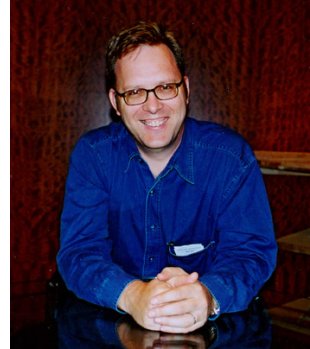 |
|
 |
 |
THE MAGAZINE OF THE SCIENCE FICTION & FANTASY FIELD
 |  |

|
 |

|
Garth Nix: Digging into Fantasy |
January 2003 |
|
Australian writer Garth Nix published his first story in 1984 and began publishing novels with The Ragwitch (1990 in Australia, 1995 in the US). His second novel Sabriel won two Aurealis Awards in 1996, for Best Fantasy Novel and Best YA Novel. Later novels include Shade's Children (1997); Lirael (2001), set in the Sabriel world; and the six-book YA fantasy series "The Seventh Tower" for LucasBooks (2000-2001). Nix has been an editor for HarperCollins Australia, a PR and marketing consultant for technology companies, and a part-time literary agent, but in 2002 gave up other vocations to be a full-time writer. His latest novel, published January 2003, is Abhorsen, sequel to Lirael; next projects include a seven-book series "The Keys to the Kingdom" and two standalone novels. He lives in Sydney with his wife and their son.
Website: Garth Nix
|

Photo by Charles N. Brown
|
Excerpts from the interview:
“There was quite a long hiatus between Shade’s Children (1997) and Lirael (2001). Lirael and Abhorsen were originally written as one book. My editor felt it should be two books - there were certain places where I covered a great deal of ground, years, in a few paragraphs. When I got this editorial letter I said, ‘Oh bloody hell,’ but eventually decided she was quite right. I don’t want to keep on writing very big novels that have to be split in two because they’re too long or they’re narratives that need more work at one end or the other. But it begs the question, do I really know what I’m doing? I’m finding out as I go along.
 “In Lirael and particularly in Abhorsen, we’re getting back to a lot of things that were not explained whatsoever in Sabriel. This involves the prehistory of Sabriel, and I had no idea it was there when I started writing it. I set up Sabriel so you could see the surface of all this mythic stuff, but I didn’t work out what was underneath until I actually needed it. In Lirael and Abhorsen I did need it, so I had to get my spade out, and as I dug down further I found more and more. Then I had to make sense of it. Even though you’ve made it up, you still can be surprised at what you find. The delicate balance lies in not saying too much. Abhorsen in particular raises questions as well as answering them. While I have no immediate plans to do anything further in that world, quite likely I will come back to it. However, you eventually have to stop digging in the same space, or you’ll get a very ugly hole in the ground. You can go and dig somewhere else, off to one side.”
“In Lirael and particularly in Abhorsen, we’re getting back to a lot of things that were not explained whatsoever in Sabriel. This involves the prehistory of Sabriel, and I had no idea it was there when I started writing it. I set up Sabriel so you could see the surface of all this mythic stuff, but I didn’t work out what was underneath until I actually needed it. In Lirael and Abhorsen I did need it, so I had to get my spade out, and as I dug down further I found more and more. Then I had to make sense of it. Even though you’ve made it up, you still can be surprised at what you find. The delicate balance lies in not saying too much. Abhorsen in particular raises questions as well as answering them. While I have no immediate plans to do anything further in that world, quite likely I will come back to it. However, you eventually have to stop digging in the same space, or you’ll get a very ugly hole in the ground. You can go and dig somewhere else, off to one side.”
*
“In my ‘Iceberg’ theory of fantasy, the story is the visible part of the iceberg, but the reader should sense there’s 90% more under the surface which they can’t see: it’s not in the story but they know it’s there. So you have that sense of much, much more there; history and myth and legend - deep stuff. One of my pet peeves in fantasy is explaining too much. Once you start to explain, you lose the mythic, the sense of mystery. Explained magic becomes technology, like a light switch, and it’s not exciting or interesting anymore. But at the same time you have to have the feeling that it could be explained or there is more to understand, it’s just not in this particular story. There are a lot of works, a lot of archetypal situations, that people respond to very strongly. If you hint at them or draw upon them or connect them in some way, that will make your story stronger, reinforce the internal reality of the fantasy.”
*
“In the future, I’d like to explore the nature of evil: how you become evil; what is evil? Fantasy is an exploration of philosophy and reality, and those are things that interest me. My characters are often in their late teens, a time when they’re not only discovering things about their world, they’re discovering things about themselves. They’re discovering their own philosophy and morality, and how it fits in with the wider world. My books are adventures, so often they have to come to grips with a whole lot of stuff very quickly. In real life it would be spread out over ten or 15 years, but they don’t have that luxury. And because it’s fantasy it tends to be more sharply defined.”
The full interview, with biographical profile, is published in the January 2003 issue of Locus Magazine.
|
 |

|
 |

